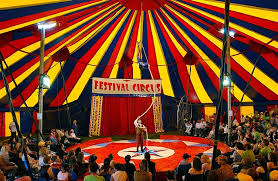circus

n. 马戏;马戏团
n.
马戏,马戏团;马戏表演(常在大帐篷里进行);环形广场,(用于某些地名)圆形广场;乱哄哄的热闹场面
变形
复数:circuses
双语释义
n.(名词)[C]马戏表演; 马戏团 (a performance by) a travelling group of people and animals who entertain the public with acts of skill and daring
[C]喧闹的场面 a noisy badly behaved meeting, etc.
[C]环形广场 a round open area where a number of streets join together
英英释义
circus[ 'sə:kəs ]
n.
a travelling company of entertainers; including trained animals
"he ran away from home to join the circus"
performance given by a traveling company of acrobats clowns and trained animals
"the children always love to go to the circus"
a frenetic disorganized (and often comic) disturbance suggestive of a large public entertainment
"it was so funny it was a circus"
同义词:carnival
(antiquity) an open-air stadium for chariot races and gladiatorial games
an arena consisting of an oval or circular area enclosed by tiers of seats and usually covered by a tent
"they used the elephants to help put up the circus"
a genus of haws comprising the harriers
同义词:genus Circus
词汇搭配
用作名词 (n.)
动词+~
present〔put on〕 a circus表演马戏
形容词+~
three-ring circus热闹的场面
词组短语
piccadilly circus皮卡迪利广场(戏院及娱乐中心)
circus wagon大篷车;(马戏团的)大篷车
circus act马戏节目
双语例句
用作名词(n.)
He performs riding stunts in the circus.
他在马戏团表演骑马绝技。
The circus placarded the city with advertisements.
马戏团满城张贴广告。
The fascinations of the circus are endless.
马戏表演非常吸引人。
The Roman circus was used for chariot and horse races.
罗马竞技场是用来举行敞篷双轮马车竞赛和赛马比赛的。
Am I on the right road to Piccadilly Circus?
我走这条路去皮卡迪利广场对吗?
权威例句
A UTP semantics for CircusA UTP semantics for Circus
A Refinement Strategy for Circus
Circus movement within the AV node as a basis for supraventricular tachycardia as shown by multiple microelectrode recording in the ...
Circus movement in rabbit atrial muscle as a mechanism of tachycardia. III. The "leading circle"concept: a new model of circus move...
Circus movement in rabbit atrial muscle as a mechanism of tachycardia. II. The role of nonuniform recovery of excitability in the oc...
The molecular complexity of glucocorticoid actions in inflammation - a four-ring circus.
Effect of digitalis on atrioventricular conduction and circus-movement tachycardias in patients with Wolff-Parkinson-White syndrome
Effects of propranolol on anomalous pathway refractoriness and circus movement tachycardias in patients with preexcitation ☆
Natural and evoked atrial flutter due to circus movement in dogs. Role of abnormal atrial pathways, slow conduction, nonuniform refr...
circus
circus: [16] Latin circus meant literally ‘ring, circle’, but it was applied metaphorically by the Romans to the circular arena in which performances and contests were held. That was the original signification of the word in English, applied in a strictly antiquarian sense to the ancient world, and it was not until the late 18th century that it began to be used for any circular arena and the entertainment staged therein.The Latin word is related to, and may have come from, Greek kírkos; and it is also connected with Latin curvus, source of English curve. It has additionally been linked with Latin corōna ‘circlet’, from which English gets crown. And it is of course, via its accusative form circum, the starting point of a wide range of English words with the prefix circum-, from circumference to circumvent (in this category is circuit [14], which goes back to an original Latin compound verb circumīre, literally ‘go round’).=> circle, circuit, circulate, crown, curve, search
circus (n.)
late 14c., in reference to ancient Rome, from Latin circus "ring, circular line," which was applied by Romans to circular arenas for performances and contests and oval courses for racing (especially the Circus Maximus), from or cognate with Greek kirkos "a circle, a ring," from PIE *kirk- from root *(s)ker- (3) "to turn, bend" (see ring (n.)). In reference to modern large arenas for performances from 1791; sense then extended to the performing company, hence "traveling show" (originally traveling circus, 1838). Extended in World War I to squadrons of military aircraft. Meaning "lively uproar, chaotic hubbub" is from 1869. Sense in Picadilly Circus and other place names is from early 18c. sense "buildings arranged in a ring," also "circular road." The adjective form is circensian.
1. He performs riding stunts in the circus.
他在马戏团表演骑马绝技。
-- 来源 -- 英汉 - 辞典例句
2. He coaxed his elder sister into taking him to the circus.
他诱哄他姐姐带他去看马戏。
-- 来源 -- 英汉 - 辞典例句
3. Circus clowns are experts at walking and running on stilts.
马戏团的小丑善于踩着高跷走和跑。
-- 来源 -- 英汉 - 辞典例句
4. She felt gross in her tutu, like something in a circus.
她觉得穿着短裙很臃肿,就象是在马戏场上一样。
-- 来源 -- 英汉 - 辞典例句
5. I was openly solicited at Piccadilly Circus.
我在皮卡底里广场遇到妓女公开向我兜揽生意。
-- 来源 -- 英汉 - 辞典例句
6. A circus clown whose mass is 1×??g steps onto the outer edge of a large disk.
体重为1×?涔0斤的杂技小丑站到一个大转盘外部边缘上。
-- 来源 -- 英汉 - 辞典例句
7. It was too bad David had measles when the circus came to our town.
真不凑巧,当马戏团来到我们镇上时戴维得了麻疹。
-- 来源 -- 英汉 - 辞典例句
8. The circus acrobats performed feats of dexterity and strength.
马戏团的杂技艺人表演了显示灵巧和力度的高超技艺。
-- 来源 -- 英汉 - 辞典例句
9. The acrobat grimaced at the children during the circus performance.
那杂技艺人在马戏表演时对孩子们做鬼脸。
-- 来源 -- 英汉 - 辞典例句
10. Circus monkeys are trained to be very docile and obedient.
马戏团的猴子训练得服服贴贴的。
-- 来源 -- 英汉 - 辞典例句
